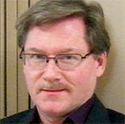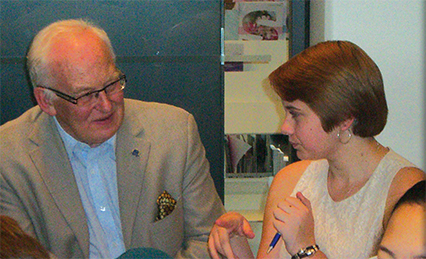Page Content
Art class is highly individualized, and Mikayla constantly
reflects upon and assesses her own work.
—Photo by Robert Gardner
McNally High School students’ perspectives on public assurance
“Many times I’ve wondered
How much there is to know”
—“Over the Hills and Far Away,” Led Zeppelin
(Jimmy Page and Robert Plant), 1973
 The eternal question “What did you learn at school today?” is perhaps more pertinent now than at any time in the past. Volatile job markets, mounting time commitments, and relentless and bewildering technological advancements, mean that what young people learn at school has taken on a new urgency in the search for better tools to navigate an increasingly complex world.
The eternal question “What did you learn at school today?” is perhaps more pertinent now than at any time in the past. Volatile job markets, mounting time commitments, and relentless and bewildering technological advancements, mean that what young people learn at school has taken on a new urgency in the search for better tools to navigate an increasingly complex world.
In response to this kaleidoscope of change, governments everywhere are directing their ministries of education to redesign how instruction is delivered and how learning may take place. In Alberta, students may now learn “anytime, any place at any pace,” as expressed in Inspiring Education (Alberta Education 2010). The province’s current curriculum redesign work and high school flexibility initiative invites a fundamental rethink of the structure of the school day and school year and may lead to a far more flexible, although possibly chaotic, understanding of how school operates. In this tumultuous environment, the question of what students learn and how we know what they learn is more pressing than ever. As some critics ask, “Are industrial models of schooling, including egg-crate–like class schedules and high-stakes testing programs, really the appropriate tools for 21st-century learning?” Despite one’s views on these sorts of sweeping characterizations of Alberta’s education system today, most educators and students agree we need to find new ways to be confident that learning really matters both to students and the future of this province. While some might see the government’s latest push for student voice, such as Tell Them From Me, as a positive move, there are real risks that this tool will simply become yet one more form of accountability that will not enhance the understanding that students and parents really need.1

Gillian and Dr. Stephen Murgatroyd discuss educational change at a meeting in Helsinki as part of the Finland-Alberta Partnership.
—Photo by Robert Gardner
Instead of relying on products developed by commercial vendors and/or governments, Stephen Murgatroyd (2011) argues that school jurisdictions need to move away from externally determined and attenuated testing programs as a means of accountability and toward a model of “assurance.” An assurance model includes concrete professional development, school performance improvement plans, peer review and assessment, and stakeholder engagement. This latter element—stakeholder engagement—will include students themselves reflecting on what their school is good at, and what their understanding of the performance of the school is. Asking students to articulate what they learn and how they know it may still be uncommon practice—the nature of schools is that someone else tells the students what they learned or did not. Nonetheless, young people can be quite reflective about what is happening at school, particularly when they are familiar with the curriculum, and we should invite them to share their thoughts frequently.
If we return to the opening question, “What did you learn today?” students themselves can provide some insightful commentary. I do distribute copies of curriculum documents to my students and I recently posed a challenge to them: if we were to eliminate exams, marks and report cards, how would you know that you learned something? After some initial silence, many students were able to explain that they were learning things even if the feedback were not in the form of test scores or described as curricular outcomes.
Vanessa, a Grade 10 student, said,
“I’ve learned that marks aren’t all about memorizing facts and fill-in-the-blanks worksheets, it’s about looking at new concepts and topics, it’s about opening your mind to what other people’s opinions are, and gaining a better understanding of the concepts learned in class. I take pride in my work, for I have learned to express my ideas in new and creative ways.”
Jordan, a Grade 10 student, noticed that
“I have developed a more noticeable curiosity. From this I have learned that sometimes you need to go beyond what you’re supposed to hand in or complete in order to truly learn about something. My understandings of concepts are coming at a faster rate, and I am able to help others, which is proof that I know the concept, and this is a more effective way of being assessed on what you know than through a test.”
Evan, another Grade 10 student, wrote,
“The most important thing I have learned was never trigonometry, chem or bio. We need some proof that [students] can manage themselves and also prosper in the field of their choice. I believe that tests are not the best way to do this. I would much rather put on a job application ‘I have the determination to work on my own without someone looking over my shoulder’ than say I can write tests.”
Alberta Education’s monograph Framework for Student Learning (Alberta Education 2011) describes some of the competencies that students should be working to develop. For example, “Students have the capacity to solve a range of problems, from simple to complex and from novel to ill-defined, related to their learning, their work or their personal lives.” Again, students can be quite aware of their development even if it is not framed as part of an assigned task, project or course unit.
Mikayla, a Grade 11 student, offered that
“...not a lot of teenagers have the capacity to be able to solve everyday problems, and that in its own accord is a problem. You have to just sometimes step back and take a look at everything from a distance, or you just have to sit and power through it all. I learned from my teachers how to put a project aside for a couple of days, yet keep it in your mind to get a different perspective on it.”
Willow, a Grade 10 student, explained,
“We learn time management, prioritizing, planning for complex tasks. These are not something you always learn in a classroom. It’s boring not to be challenged. Taking on additional tasks and making mistakes is hard but it’s more effective than someone telling us. And you apply that to other areas of your life even if it’s not on a report card.”
Anisa, a Grade 10 student, described the skills she was learning.
“Time management—able to balance between a part-time job, teaching karate, and maintaining above-average grades; motivation—going beyond the required standards by doing extra research and unassigned homework; making connections—using different perspectives and different scenarios to generate conclusions and possibilities about world issues.”
Nathan, a Grade 12 student, wrote about his strategies for getting through school knowing that he struggled with English as his second language.
“People are based on thier abillity to adapt. Clearly my written work is that of a five year old and I would fail english. Instead of giving up I was inovative enogh to do extremely well on my oral presentations.” [sic]
Erin, a Grade 10 student, summarized her own understanding.
“I know that I learned something because I have been noticing patterns and scenarios that remind me of my [Social Studies 10-1 individual research project in ethnomusicology]. I recognize connections between culture and music in real life. I feel my marks are where they need to be, but more important, I’ve noticed a shift in my thinking since starting at this school and that assures me more than anything else that I am being well educated.”
These reflections come about because the students have been exposed to the ideas in Inspiring Education, the Framework and the skills outcomes from the program of studies. The documents are discussed in class. In addition to giving out curriculum guides, some of the questions we could pose to students would serve to open up the dialogue with students and help to find assurance that good learning is taking place.
- What evidence should teachers and parents accept that you have learned something?
- What has been your best moment in school? What did you learn and how would others know that you learned something?
- In what ways have you demonstrated initiative, resilience or perseverance in your school experiences?
The objective of these and similar questions is to cultivate more engaged, less passive students attuned to their own progress and less reliant on others telling them what they know.
Gillian, a Grade 10 student, offered a final thought about how she views education and learning.
“I think a good education is one that makes you ask questions. One that angers you and makes you want to dig deeper, not because you have to, but because you wish to. So, do you know you’re being taught well when your mother asks you what you learned today and you can give her a straight answer? The knowledge that every teacher that you speak to truly wants for you to succeed is a powerful thing; you really know that the people who are directly responsible for your education truly want you to understand.”
A serious move to assurance from accountability will likely require that teachers, students and parents become well versed in curriculum—not simply the content and knowledge outcomes, but the newly proposed competencies. This is not a bad thing. It is important that parents and students are familiar with the goals of the curriculum, even more so now that we are apparently on the path to redesigning the K–12 programs of study. We need to move beyond a simplistic focus on student surveys, such as Tell Them From Me, which in the end, will generate data for the government’s groaning bureaucracy, but little meaningful knowledge and wisdom for school leaders. When students truly understand what it is they are expected to learn, they become more active and reflective partners in their learning and thus offer some assurance that learning is taking place.
References
Alberta Education. 2010. Inspiring Education. Edmonton, Alta: Alberta Education.
———. 2011. Framework for Student Learning. Edmonton, Alta: Alberta Education.
Murgatroyd, S. 2011. Rethinking Education. Edmonton, Alta: FutureThink.
Robert Gardner teaches social studies at McNally High School, in Edmonton.
1 In November 2013, the Alberta government signed a three-year contract with a private vendor to develop a new student survey tool that, in effect, creates the need for schools to adopt another form of external accountability.
